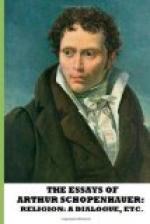Demopheles. I think that it will very often do so, especially when its influence works through the medium of custom. An atrocious act is at once felt to be repulsive. What is this but the effect of early impressions? Think, for instance, how often a man, especially if of noble birth, will make tremendous sacrifices to perform what he has promised, motived entirely by the fact that his father has often earnestly impressed upon him in his childhood that “a man of honor” or “a gentleman” or a “a cavalier” always keeps his word inviolate.
Philalethes. That’s no use unless there is a certain inborn honorableness. You mustn’t ascribe to religion what results from innate goodness of character, by which compassion for the man who would suffer by his crime keeps a man from committing it. This is the genuine moral motive, and as such it is independent of all religions.
Demopheles. But this is a motive which rarely affects the multitude unless it assumes a religious aspect. The religious aspect at any rate strengthens its power for good. Yet without any such natural foundation, religious motives alone are powerful to prevent crime. We need not be surprised at this in the case of the multitude, when we see that even people of education pass now and then under the influence, not indeed of religious motives, which are founded on something which is at least allegorically true, but of the most absurd superstition, and allow themselves to be guided by it all their life long; as, for instance, undertaking nothing on a Friday, refusing to sit down thirteen at a table, obeying chance omens, and the like. How much more likely is the multitude to be guided by such things. You can’t form any adequate idea of the narrow limits of the mind in its raw state; it is a place of absolute darkness, especially when, as often happens, a bad, unjust and malicious heart is at the bottom of it. People in this condition—and they form the great bulk of humanity—must be led and controlled as well as may be, even if it be by really superstitious motives; until such time as they become susceptible to truer and better ones. As an instance of the direct working of religion, may be cited the fact, common enough, in Italy especially, of a thief restoring stolen goods, through the influence of his confessor, who says he won’t absolve him if he doesn’t. Think again of the case of an oath, where religion shows a most decided influence; whether it be that a man places himself expressly in the position of a purely moral being, and as such looks upon




